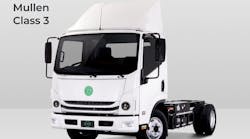Ferus Inc. has improved the efficiency of its customer service and internal operations since it began using Trans+Plus System Corp.'s Fleet Manager Professional software early in 2007. Alberta-based Ferus specializes in the production, transport and storage of cryogenic fluids — specifically liquid carbon dioxide and liquid nitrogen — to customers in the oil field industry.
Besides using the Trans+Plus transportation dispatch and operations management software technology as a standard vehicle dispatch tool, Ferus has had it customized on the back end to help manage, maintain and track company assets. It also provides customers with the assurance of billing accuracy by replacing driver tickets with satellite-based data collection capabilities.
“Changes in the way we collect data have resulted in a significant reduction in manual processing time and the elimination of huge amounts of paper,” says Corey Szott, vp-marketing and sales. “Fleet Management Professional also allows us to produce detailed business and customer reports, simplify logistics and cut transport costs. In addition to reducing billing cycle time, our order disputes have dropped nearly 90% because customers are now more confident in the accuracy of the data we provide using the software system and GPS monitoring.”
Ferus, which is 100% energy-focused, provides logistics and transportation services to oil field customers primarily within Alberta, although some deliveries are made to parts of British Columbia and Saskatchewan as well. “For the past six months we've also been working on starting up a U.S.-based business in the area of the Rocky Mountains of Colorado,” says Szott.
He notes that Ferus started doing business in Canada late in 2004. “We provide the energy industry with liquid CO2 and nitrogen from our production plants in Alberta. We currently have three CO2 facilities and two nitrogen ones, with a third opening sometime this year. We select and build production and transport facilities to be in close proximity to our customers in the oil fields.”
The company's fleet of specialized tankers includes 30 liquid CO2 and 30 liquid nitrogen carriers. The nitrogen tankers have both an outside shell and inner barrel to create a vacuum for the nitrogen and keep pressure in, whereas the CO2 units require only a single shell.
The tractor fleet is a composite of various makes and models, including Western Stars and Peterbilts, which Ferus plans to keep five years before trading in. Fifty units are spec'd as tri-axle tractors to allow for higher payloads of 28 to 30 tons. There are also 15 tandem-axle power units that hold payloads of 18 to 19 tons.
“All our equipment is oil field-specific in design and can be driven on- or off-road,” Szott explains. “They're built to be capable of going directly onto a work site — where we can either pump fluids directly from our tankers or off-load product into on-site storage vessels when we don't want to keep large numbers of transports sitting at a job for a long period of time. We also transport product over-the-road to our customers' own yard storage facilities. Our primary focus with the GPS and Trans+Plus software is to know where our vehicles are so we can fully utilize the fleet at all times.”
A key issue for Ferus, Szott points out, is finding and keeping good drivers. There are currently 86 full-time company drivers, and during peak times owner-operators are hired additionally. “Manpower is always an issue, and this job requires good drivers. When we find them, we take care of them.”
Ferus performs 80% of the maintenance on its fleet. Right now, the company has three base stations for maintenance in Canada and one in the U.S., and each station employs between two and three technicians.
“The type of environment we work in can sometimes be difficult,” Szott says. “Because we're dealing with oil fields, business is very volatile — sometimes we are very busy, other times really slow. We also have very long distances to travel to get to customers' work sites, so mobilizing our fleet to meet their needs can be quite challenging. Having in place top-notch dispatch equipment and fleet management software, along with a good staff, has been really beneficial to us.”


